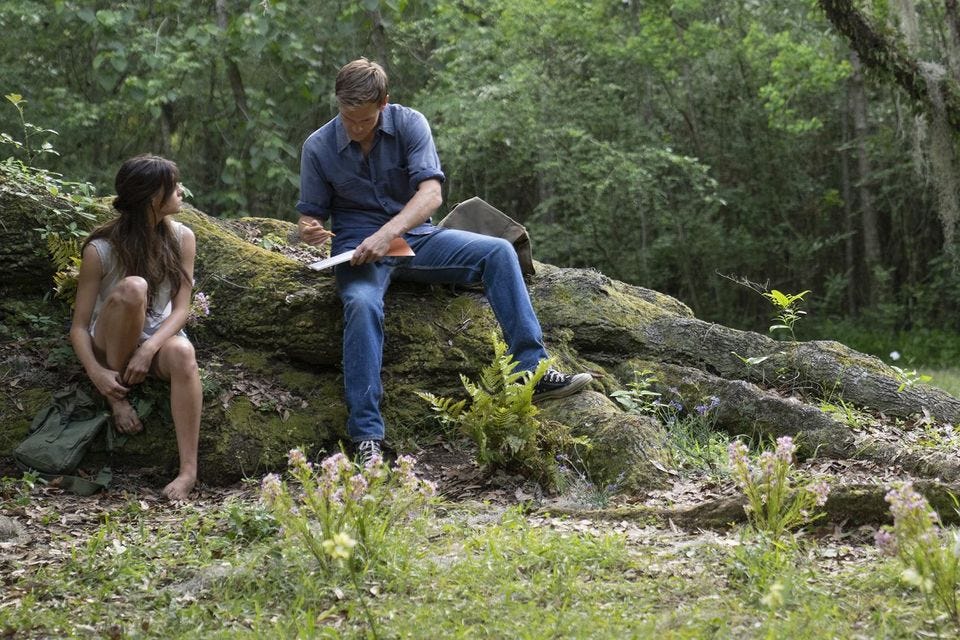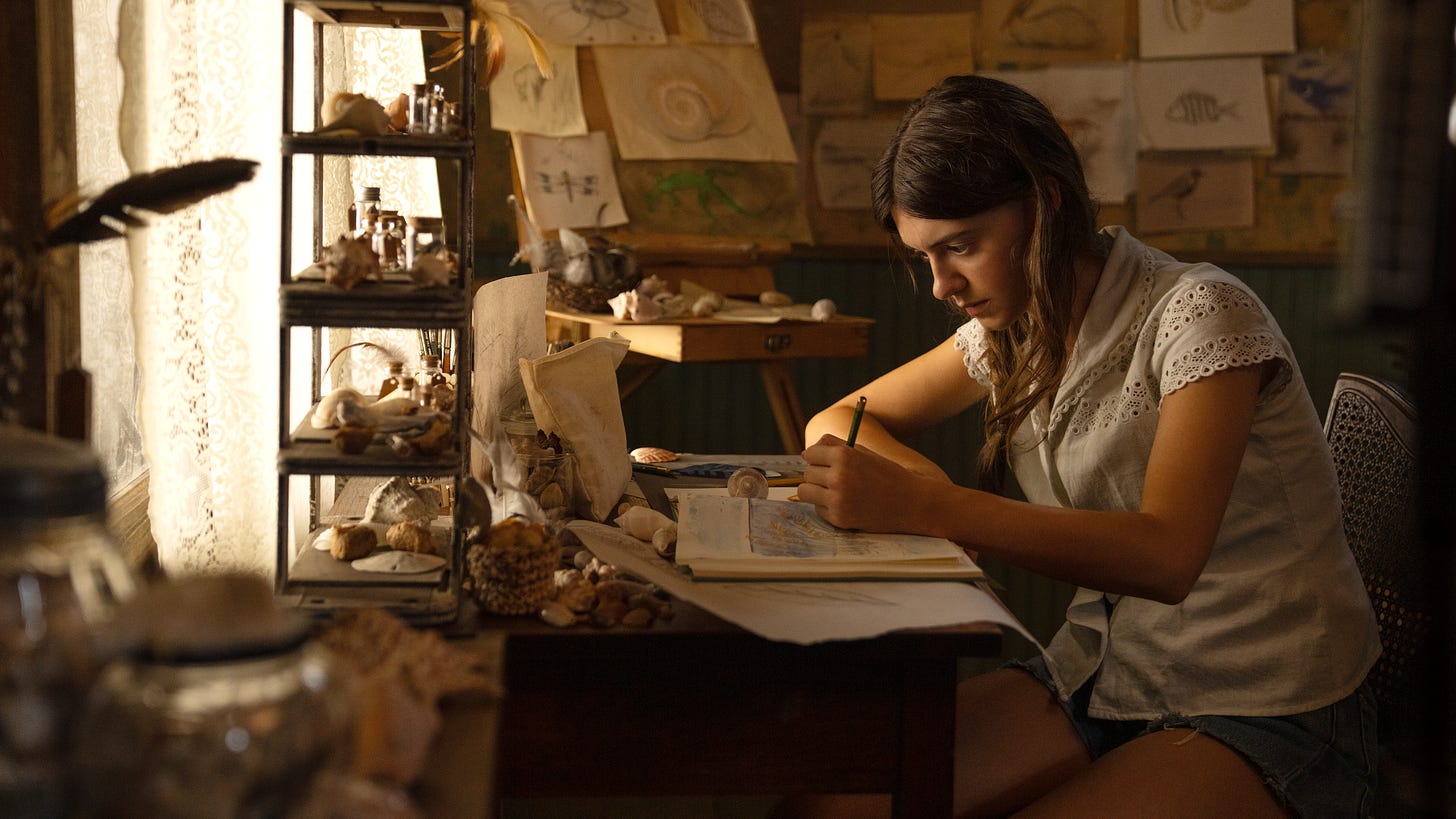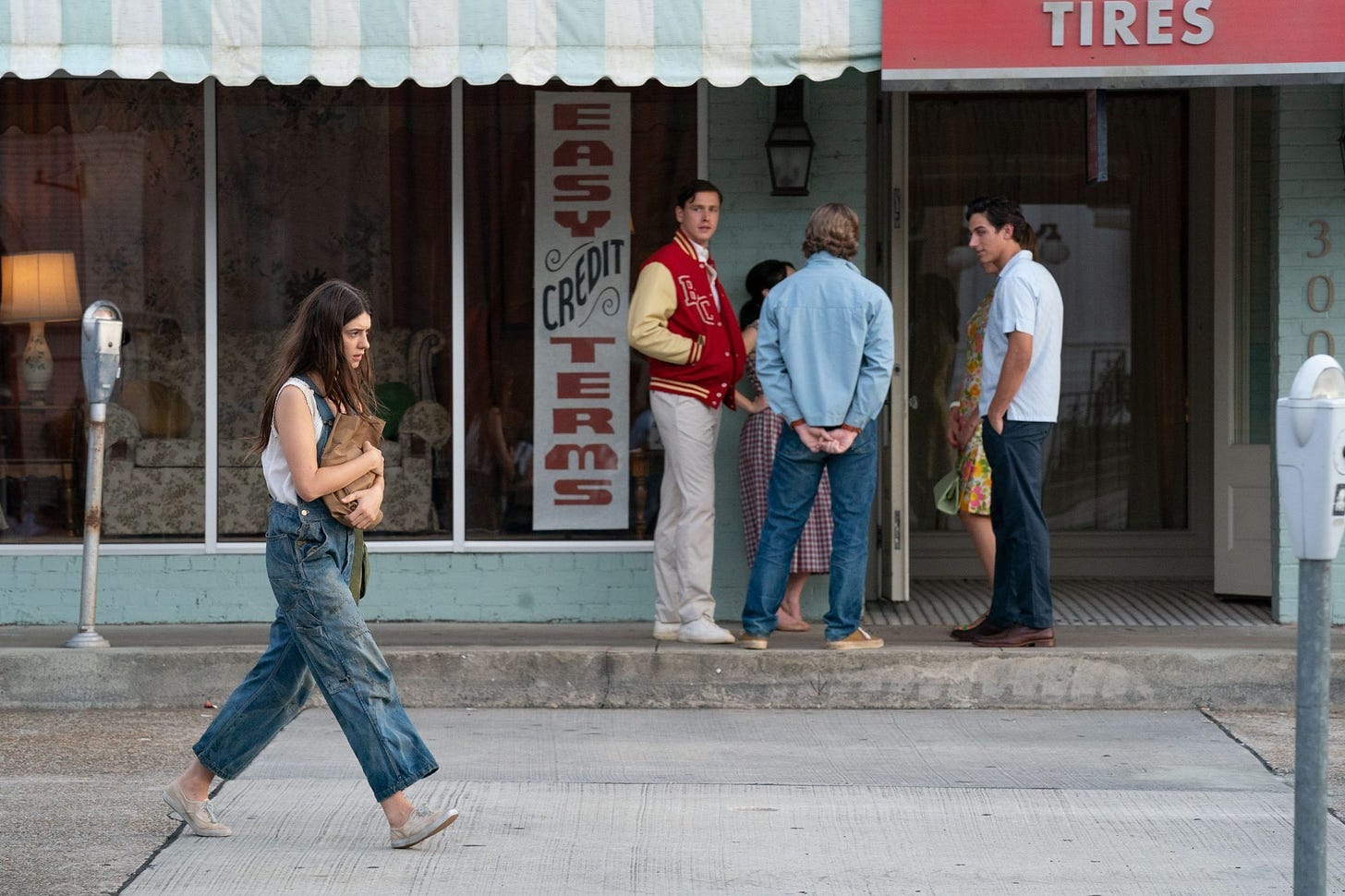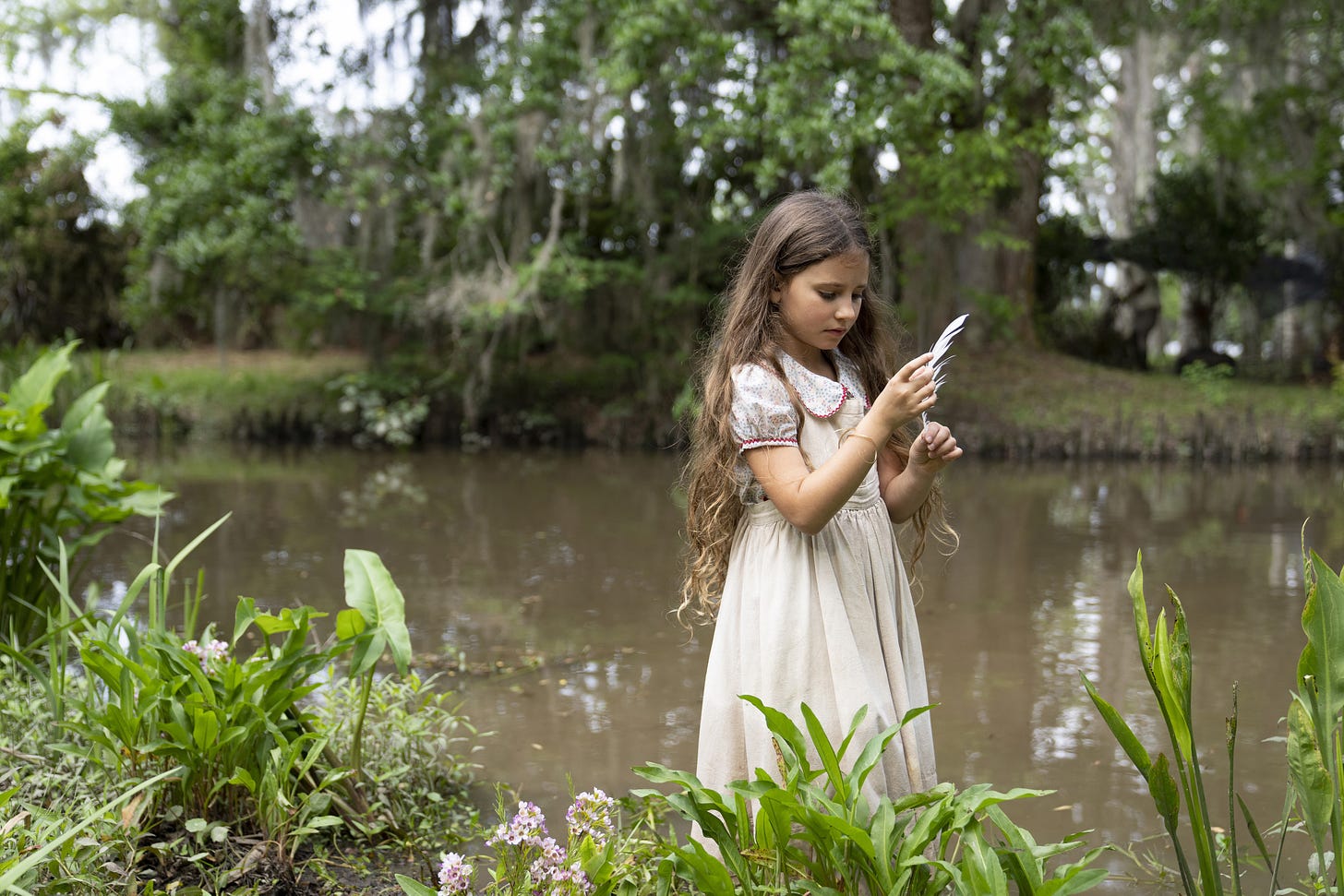Where the Crawdads Sing is a flawed yet poetic, gorgeous, fairytale-like movie
Where the Crawdads Sing is for anyone who loves poetry, who craves an escape, who yearns for a visual wonder, flaws and all.
Dear hopeful reader,
This was going to be a completely different essay at first. I was going to concentrate on a scene from Where the Crawdads Sing (2022) that made me exclaim a visceral “No!” That meant spoiling the entire movie. Then I wanted to rather write on the lessons I learned, observations I made, and experiences I felt while watching this breathtaking film. However, the essay took a different turn mid-way—how curious!
Where the Crawdads Sing is based on Delia Owens’ debut novel with the same title. Her first fiction book—which I have yet to read—is inspired by her experience living in the wilderness, and the isolation and loneliness that come with this kind of life.
A retired zoologist and conservationist, Owens first co-wrote non-fiction books, including Eye of the Elephant, with her then husband, Mark Owens, about their experience studying and saving wildlife in Africa.
I’m aware of the controversy surrounding the Owens family regarding a killed poacher in Zambia, a tragedy that still remains unanswered. I won’t take the Owens’ word for it per se, but I want to give them the benefit of the doubt. In the end, only the people who were there know the truth, and we, the non-witnesses, can only speculate.
By April 2023, Delia’s novel, which released in 2018, had sold 18 million copies. Surprisingly, it became a bestseller from the get-go. By surprisingly, I mean it blends genres that don’t necessarily go together—a romance, mystery, and coming-of-age story all in one. Yet, it works in Where the Crawdads Sing. And it appeals to a wider audience.
Perhaps another reason why it became so successful is the exploration of loneliness, isolation, and survival in its pages. Aren’t we all lonely and isolated to some degree? Aren’t we all struggling and surviving something? So, we can relate and/or empathize with the struggles of the novel’s protagonist.
The film produced by Reese Witherspoon and Lauren Neustadter, written by Lucy Alibar, and directed by Olivia Newman is also likened by the general public, not so much by the critics. But I would recommend trusting the viewers more. The patterns are oftentimes telling and reflective of a movie’s quality and success, with some exceptions. I mean, obviously, Tommy Wiseau’s The Room (2003) is the pinnacle of heightened cinema that’s so misunderstood. But I digress.
Where the Crawdads Sing, I read, stays faithful to the book for the most part. It follows Kya, or the Marsh Girl, tried for murder of the local big-deal, Chase Andrews. The events switch between Kya’s childhood when she was abused by her father and abandoned by her whole family, thus being forced to raise herself on her own in the North Carolina marshland, and young adulthood when she experiences the highs and lows of romantic relationships and becomes a naturalist and published author.
Because of her unconventional life and lifestyle and the myths that follow her, most townsfolk judge her prematurely. Being an outcast from others in the small-town community in the 60s makes her an unfortunate prime suspect for the murder.
Where the Crawdads Sing is flawed in some ways. The way Kya was abandoned as a child left me speechless and skeptical. And somehow she grew up to be sophisticated, well-rounded, and soft-spoken—not that there’s anything wrong with that in any fictional protagonist or real-life person—while being brought up only by nature.
Nature can be a bitter and gentle teacher, yes. You’d think the main character would still be rough around the edges for the traumatic experiences she’s endured—abuse, abandonment, alienation. You’d think she would be more complicated, gritty, less open. She’s dreamlike, and for someone who is shunned by most of her community, she doesn’t quite look the part of the othered.
The adaptation runs a little over two hours, yet it still feels rushed. More time could have been given to her childhood and the discomfort of growing up—you know, puberty is hardly fun and even more challenging in the 50s and in aloneness—while fending for herself to fully establish her as a protagonist we’re meant to care about and relate to, to show her in different situations and the complexities of her character.
There could have been more scenes with the stillness as well as the harshness of the marshes. More insight could have been shared about the wilderness and wildlife of North Carolina landscapes. We could have better understood how and why nature is so important to Kya, how and what she learns from her surroundings.
Understandably, film adaptations are hard to produce. A lot needs to be cut, some changes need to be made. But most film adaptations—or all the ones I’ve seen—are lacking in something. Even if one hasn’t read a book and they watch a movie based on it, they could tell something is missing, some parts are rushed. Perhaps such a gripping and involved story could have been better adapted as a show with more fleshed-out and nuanced characters, elaborate plots, and encompassing settings.
But, because I’m an escapist and this is fiction, I was ready to overlook any plot holes and shut off my rational brain through most of my viewing. With so many movies grounded in reality out there today, I wanted to plunge into an old-school type of fantasy. And Where the Crawdads Sing is that, beautifully and unabashedly so. How A Walk to Remember was two decades prior, also set in North Carolina, also adapted from a novel.
In fact, Elizabeth Gabler, the president of Sony’s book-to-movie division, 3000 Pictures, who launched this film unit with Where the Crawdads Sing, stated that the fans of Crawdads “want to lose themselves in a fantasy.” Likewise, Delia Owens was very much involved in the creative process of the movie, so it is as much her vision as it is theirs.
And what a gorgeous, fairytale-like result! Each scene is absolutely marvelous and transporting. Despite being challenged by erratic weather patterns during filming, the production designer, Sue Chan, and cinematographer, Polly Morgan, ensured each set and scene would be aesthetically painterly, soft, and natural and complementary to the settings being filmed and Kya’s inner world. Hence, the movie is cinematically pastel and delicate—like indeed a fantasy, like a dream.
The sights we, the viewers, behold are nothing short of stunning. While Where the Crawdads Sing is set in North Carolina in the 50s and 60s, the filming took place in New Orleans and Houma in Louisiana, among other surrounding locations. We’re transported to sandy beaches, wild marshes and swamps, sun-dripping bodies of water. We witness the ancient wisdom of the grandiose oaks dressed in Spanish moss, the lyrical migration and flocking of birds, and the feathers they leave behind. How refreshing to see nature take up importance—at the very least visually—something rather rare in a movie.
The poetic quality bleeds into the script. Kya says things like “Marsh is not swamp. Marsh is a space of light where grass grows in water, and water flows into the sky. Then within the marsh, here and there, true swamp.” or “Whenever I stumbled, the marsh caught me. At some unclaimed moment, at last, the heart pain seeped away, like water into sand. Still there, but deep.” Those who live and breathe poetry can appreciate that in a film like Where the Crawdads Sing, and maybe lose themselves in the verses. I certainly did.
After my experience watching Crawdads, I couldn’t help but notice nature more whenever I would take a walk: the cumulus up in the sky today; how many leaps this one frog took to its pond; the redbird a speck of crimson against the green of leaves like in a painting; if it’s humid or dry at the moment; the turtle that got lost on the asphalt.
When we notice the little things around us, we’re more present, less troubled. We allow ourselves to marvel at life. And there’s so much to marvel at. Every day there’s something new to discover, to know, to understand. And I have Where the Crawdads Sing to thank for opening my eyes a bit more, and my dear mama for recommending it.
Where the Crawdads Sing is for anyone who loves poetry, who craves an escape, who yearns for a visual wonder, flaws and all. Finally yet importantly, it has a lot of heart and was made with utmost love and care for the source material and the author.
Have you seen the film? What are your thoughts of it? What is your beloved movie that’s absolutely poetic, gorgeous and fairytale-like?
Yours hopefully,
Nadia










This is an amazing review of the movie. In cliche fashion, I tend to enjoy action movies and thrillers while my wife loves movies like this. But I watched it and thoroughly enjoyed it, mainly because it had so many poetic moments, as you so artfully pointed out.
Well this is very timely! We were going to watch this this week! It's long been on the list but, like so many things, just hasn't been gotten to yet.
Wonderful review and thoughts. I will be returning to this once we've watched it.
Also, loved this: "When we notice the little things around us, we’re more present, less troubled. We allow ourselves to marvel at life."
I need more of this at the moment.